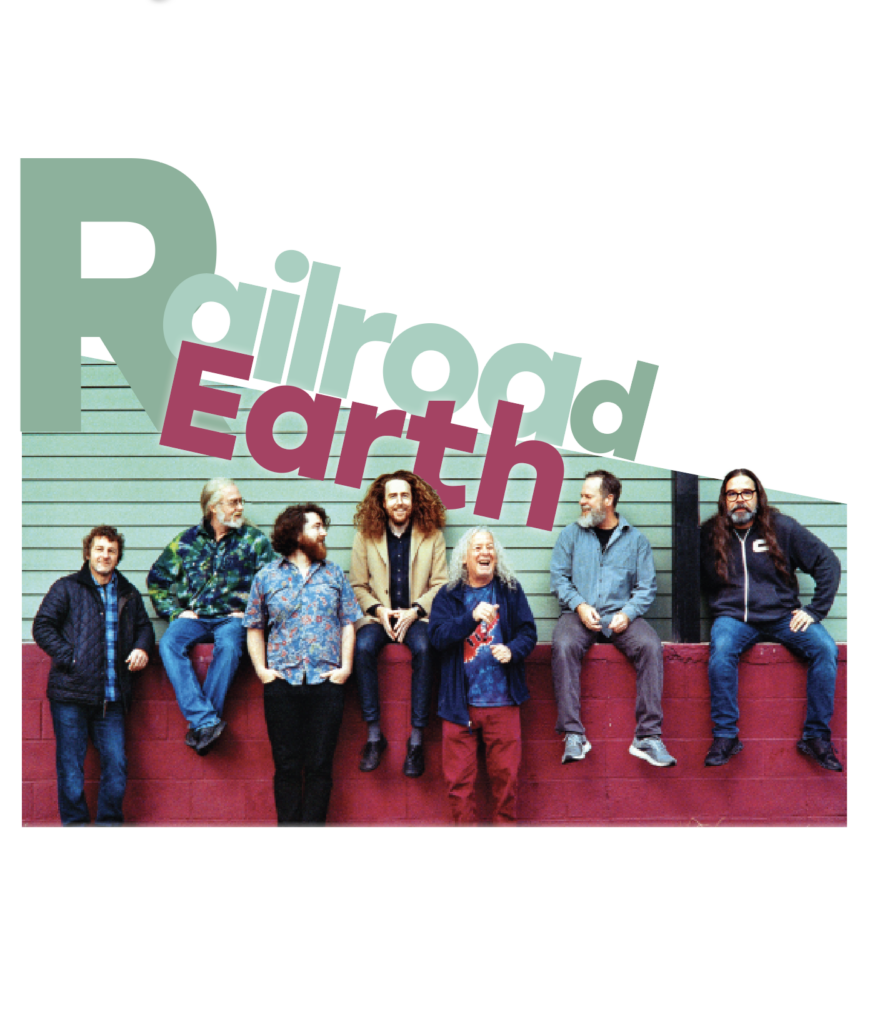Saturday, Nov. 4 at 7:30 p.m.—RUTLAND— Railroad Earth, a celebrated quintet from New Jersey, has been captivating audiences with their unpredictable live shows and eloquent studio output for over two decades. The group introduced their signature sound, bluegrass-influenced Americana, on 2001’s “The Black Bear Sessions. “Since then, they have sold out hallowed venues such as Red Rocks Amphitheatre in Morrison, Colorado, and launched the longstanding annual Hangtown Music Festival in Placerville, California, and Hillberry: The Harvest Moon Festival in Ozark, Arkansas—both running for a decade-plus. Railroad Earth has earned widespread critical acclaim from David Fricke of Rolling Stone, American Songwriter, Glide Magazine, and NPR, among others.
In 2018, Railroad Earth bade farewell to founding member Andy Goessling, who passed away from cancer. His shadow loomed over the process as the band retreated to New Orleans for the first time to record their seventh full-length album, “All For The Song. “The album chronicles the twists and turns of the band’s journey through eloquent songcraft, bluegrass soul, and rock ‘n’ roll spirit.
“Perhaps it represents the journey we’ve been on for 20 years as a band and as a family,” observed Carey Harmon, the band’s drummer, according to the band’s biography on www.railroad.earth.
The guys retreated to New Orleans to record the album, and it was a homecoming of sorts for Anders Osborne, who produced the record. It might’ve been the gumbo, but the guys seamlessly absorbed the homegrown flavors of the Big Easy by osmosis, incorporating horns, blues harmonica, and the producer’s own perspective and guitar playing.
“His enthusiasm is contagious,” exclaimed Harmon. “There are five producers in this band, so a strong-willed voice from the outside is usually pretty essential. Anders was the voice.”Todd Sheaffer, the band’s lead vocalist and acoustic guitarist, agrees: “He brought a pure and striving soul, unforgettable laugh, rich palette of emotion, a great stash of guitars and amps, philosophical driftings, freedom, unguarded honesty, warmth, and love.”
The band paved the way for the album with “The Great Divide,” “It’s So Good,” and “Runnin’ Wild.” Beyond those initial singles, the record picks up steam on “Blues Highway.” Over dusty acoustic guitar, hummable fiddle, and a banjo pluck, Todd Sheaffer, (lead vocals, accoustic guitars,) recounted a particular road trip down Route. 61, which ended in “the most downpour of rain I’ve ever experienced.”
“We had a show in Natchez, so I decided to make my own adventure out of the trip,” he recalled. “I flew to New Orleans, rented a car, and drove up the Blues Highway like a tourist, stopping and touring the old plantations and blues honky-tonks. I was smelling the river and the refineries. On my return to New Orleans, I drove into what might’ve been a hurricane with intense and terrifying lightning to boot. In the dead of night, I gave up trying to inch down the road, pulled over, and waited it out. The trip seemed like a parallel for my life at the time and inspired the song.”
The epic “Driftin’ The Bardo” hinges on one of the final recordings of Goessling on ukulele and high-strung guitar. It slips into a poignant piano-driven crescendo punctuated by cinematic strings.
“As we were recording it, ‘The Bardo’ came to represent Andy’s transition,” revealed Tim Carbone, the band’s violinist, electric guitarist, and vocalist. “It was an emotional experience.”
Clocking over eight minutes, “Showers of Rain” unfurls as a “psychedelic excursion” complete with an improvised jam, guitar solo by Anders, a dreamy string section, and imagery “inspired by a strange 19th century novel called Green Mansions.”
“We all have those moments when we feel visitations and remember loved ones we’ve lost,” Sheaffer observed. “In New Orleans, Andrew shared with us the night previous he’d had a visit from Andy in his sleep. At my house, we have a cardinal who taps on the window, and my wife thinks it’s her mom. These are the thoughts in the middle of the song where I ask, ‘Was that really you?’”
The album culminates on the wistful “All For The Song” as the final refrain, “All of the heartache, all that’s gone wrong, all for the moment, all for the song,” rings out before a harmonica passage.
“It’s a bit painful to contemplate or talk about, to be honest—as are a couple of other tunes on this record,” confessed Sheaffer. “The song says way more than enough, I believe.”





